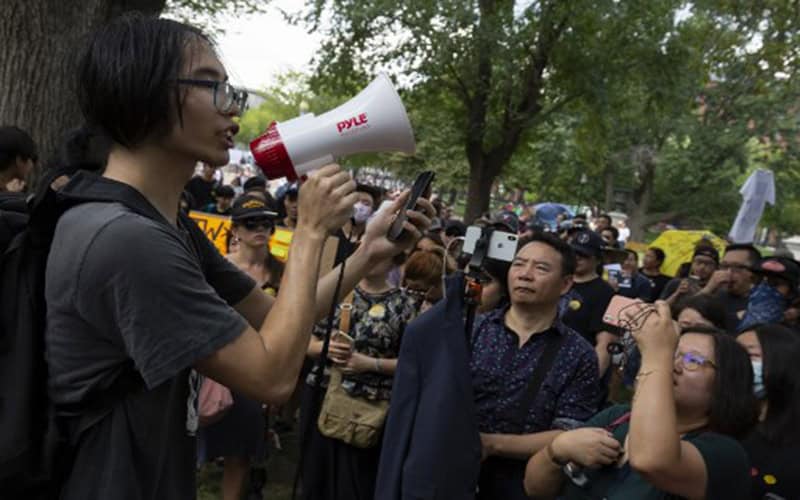Hong Kong: After weeks of escalating violence Hong Kong’s pro-democracy movement has pivoted back to its peaceful origins, but experts and activists predict the hardcore fringe will soon return without swift concessions from the city’s Beijing-backed government.
Organisers hailed Sunday’s peaceful mass march, which drew hundreds of thousands to the city’s streets but saw no arrests, as evidence protests had not spiralled out of control.
It was a rare weekend free from tear gas and police baton charges since protests erupted in June against a bill that would have allowed extradition from the semi-autonomous city to mainland China.
Police and protesters have traded blame for the ugly clashes, which have by turns shut the finance hub’s airport, left city streets strewn with bricks and engulfed in tear gas — and stunned a global financial centre once proud of its reputation for prosperity and stability.
After two-and-half-months the protesters are likely to use a hybrid “of peaceful, non-violent protests as well as an escalated use of force by the radical fringe,” according to Willy Lam, a political analyst at the Chinese University of Hong Kong.
“Both will go on,” he said, in the absence of the government’s accession to their calls.
Protesters have five core demands including for Hong Kong’s embattled leader Carrie Lam — seen as a Beijing stooge — to step down, the complete withdrawal of the incendiary extradition bill and an inquiry into alleged police brutality during the protests.
So far, Hong Kong’s Beijing-backed government has refused to budge, saying it will “begin sincere dialogue with the public” only once order is restored.
The extradition bill, which has been suspended but not formally withdrawn, has become a totem of the shrinking freedoms in Hong Kong, as China tightens its grip on the city.
While millions have hit the streets in remarkable scenes of peaceful people power, protests have also sunk into violence between riot police armed with tear gas, batons and rubber bullets and a minority of rock-throwing protesters.
“We started very peacefully but it seems that the government has not responded to our five demands,” said a masked activist identified only as Brian at a press conference on Monday.
“One thing leads to another,” he added, refusing to rule out future unrest.
Hong Kong police accuse hardcore protesters of driving the city into chaos.
“If protesters do not use violence, police will not use force,” Superintendent John Tse told reporters on Monday.
– ‘High price for protest’ –
The potential for an intervention by Chinese security forces backlights the protests.
Beijing has accused protesters of “terrorist-like” actions, while state media has run images of a military build-up in neighbouring Shenzhen.
With the Hong Kong’s future at stake, radical protesters say they are prepared to walk a tightrope between non-violence and direct action.
“Revolutions without bloodshed are very rare,” said Adrian, a 24-year-old protester.
“But not everyone is suited for confrontation. The price that protesters have to pay will be very high, so those favouring force need to assess their baseline.”
Talk of strategic splits among a leaderless, mass movement galvanised by outrage at alleged police brutality and corralled by social media have mounted in recent days.
But after another massive show of public support on Sunday some experts say there is no danger the protest momentum could wane.
“I think they’re in a very good place,” Suzanne Pepper, an honorary fellow at the Chinese University of Hong Kong told AFP.
“Pro-democracy partisans have never before been able to mobilise so many feet on the ground… against the growing intrusion of (Chinese) mainland ways and means here.”
Beijing could also quickly defang the protests by conceding to key demands, including the resignation of Carrie Lam, scrapping the extradition bill and ordering a full probe into allegations of police violence, experts say.
If it did so, the momentum behind the “the movement will be withered,” said political analyst Dixon Sing.
“Beijing then does not need to risk facing an all-out campaign for full democracy.”

